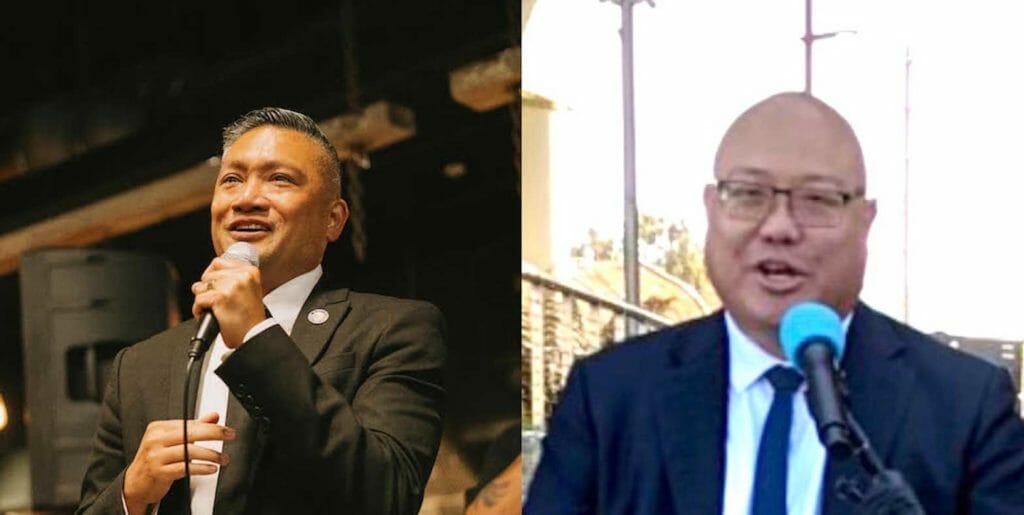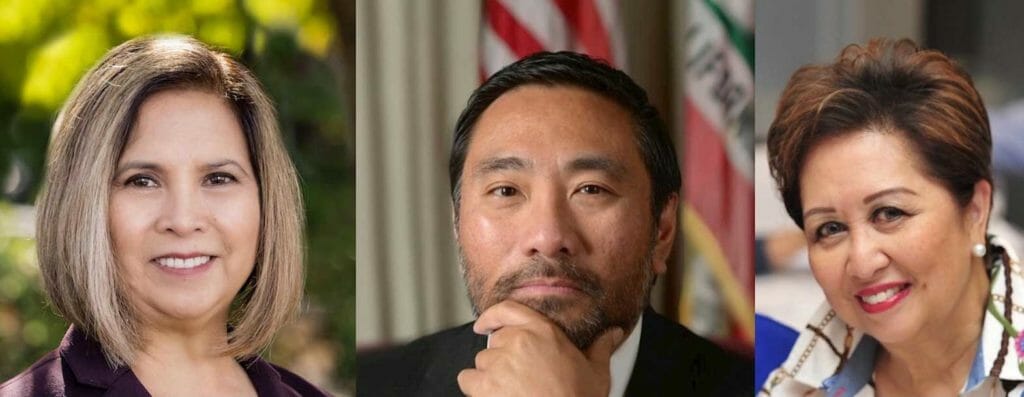Five SF Bay Area Fil-Am mayors, vice mayors running for re-election

Mayors Rod Daus-Magbual of Daly City (left) and Mark Nagales of South San Francisco. CONTRIBUTED
SAN FRANCISCO – Five Filipino American council members – two mayors and three vice mayors – are running for re-election in the neighboring San Francisco Bay Area cities of Colma, Daly City and South Francisco.
How they fare on Nov. 8 will affirm the electability of Fil-Am candidates and the power of the Fil-Am vote in each city, where Filipinos outnumber other residents of color.
Daly City
Mayor Rod Daus-Magbual
Before venturing into politics, Daly City Mayor Rod Daus-Magbual, EdD, was an adjunct professor. Since his victorious first bid in 2018 to be the fourth Fil-Am on the five-person City Council, he has become a full-time tenured track Ethnic Studies Professor at Skyline College.
As mayor he proposes a business vacancy tax on empty storefronts that refuse to activate or rent out to potential businesses. The move would “provide revenue streams for our city,” he told INQUIRER.net.
He wants his town, the most populous in San Mateo County, to shift to a “greener economy and infrastructure.” To start, he urges low-income communities to avail themselves of rebates for e-bikes and electric car programs.
Born in Winnipeg, Manitoba, where his parents immigrated from the Philippines for his mother’s nursing job and where his father worked in the labor sector, Daus-Magbual witnessed the struggle of immigrants has introduced respected community activists to his students.
Magbual serves as executive director of Pin@y Educational Partnerships, a nonprofit tandem program with universities that trains prospective educators of every level in “decolonizing” curriculum development, lesson planning and teaching.
The father of two says his ultimate goal is to continue toppling barriers for his children’s generation onward. His wife, Dr. Arlene Daus-Magbual, is his collaborator in fostering cultural pride among Fil-Am youth.
“I grew up watching Fil-Am celebrities who denied their cultural identity because of pressures of assimilation or the public perception that being Filipino was not popular. Being a Filipino American mayor is a historical responsibility that I take pride in,” he explains.
He often quotes pioneer activists like farm worker organizer Philip Vera Cruz and historian Dr. Dawn Mabalon, referring to their example and sacrifice as his inspiration.
“Being elected is a seat at the table,” in making a difference in the lives of some108,000 residents of whom 40 percent identify as Filipino.
Vice Mayor Ray Buenaventura
When the late leader Alice Bulos was finally honored in perpetuity with a highway marker, it was the, Ray Buenaventura who thought of it. Buenaventura has also poured his endorsement and physical presence at the campaign sorties for his three Fil-Am colleagues in the Daly City Council, where the four of them occupy the five seats.
Buenaventura takes pride in his record of public safety, supporting increased funding for police and firefighters. First elected in 2011, the Philippine-born lawyer may not be proficient in Tagalog, but he is quick to respectfully greet elders, putting his forehead on the back of their hand in the customary “mano po.” His quarter-century law practice focuses on indigent criminal defense.
In 2014 Buenaventura lost the race for San Mateo County Superior Court, but he has become the elder statesman among his fellow Council Members.
South San Francisco
Mayor Mark Nagales
Of all sitting Fil-Am City Council members, SSF Mayor Mark Nagales has had the longest on-the-job training, having been an aide to the late California Assembly Member Gene Mullin and constituent services director with the office of U.S. Rep Jackie Speier.
Nagales hit the political road running after taking his oath in 2018 as the first male Fil-Am council member. Even his day job as Outreach Manager for a leading fair housing nonprofit echoes his progressive political roots.
Nagales counts as his achievements leading his town in passing Guaranteed Basic Income during the pandemic and making housing and child care affordable.
“We’re helping uplift our most vulnerable populations — 160 households are receiving $500 a month for one year,” he told INQUIRER.net, lauding his city’s emergence as a “leader in tackling the affordability crisis.”
“I’m in the process of finding a location to build a new childcare center in Westborough,” pinpointed by data as site for the highest need, he said. “I was able to allocate several millions of dollars from our city budget to build a new child care center in Westborough. We’re also converting the old library to a new childcare center. That project should start in a few years. So childcare will continue to be a priority.”
The San Francisco State grad says he is guided by “Remember where you come from, because they are the people who got you there” as his philosophy.
“I remember growing up, I didn’t see a lot of people that looked like me in leadership positions. The fact that I’m the first Filipino mayor in South San Francisco is a culmination of years of hard work that my mentor Alice Bulos had been working towards. I think she’d be proud knowing that both the current mayor and vice mayor are Filipino” in a city of 67,000 residents, he said.
He acknowledges his ex-boss and high school teacher, Gene Mullin and Speier, as major influences. From them he learned to “listen to all sides of the argument,” find ways to “help those in need” and “always give back.”

From left: Vice Mayors Flor Nicolas of South San Francisco; Ray Buenaventura, Daly City; Joanne del Rosario, Colma. CONTRIBUTED
Nagales praises his wife and campaign manager, Amy, mother of their two children, as “a big reason for my victory.”
“My dream is to be able to serve on the city council for 20 years. If I can do that, I can look back and know that I served my community well,” says the Manila-born racial barrier-breaker.
Vice Mayor Flor Nicolas
Long before 2018, when she became the first Filipina elected in South San Francisco, Vice Mayor Buenaflor “Flor” Nicolas had already been serving her adopted hometown for over three decades. In her parish and her neighborhood, she led and contributed to programs benefiting schoolchildren and older adults through sports and cultural festivities.
Midway into her first term, she was named chair of her city’s Commission on Racial and Social Equity to probe and address “racial injustice in public safety, barriers to economic and educational opportunity, and access to quality healthcare.”
The body established the Equity and Public Safety Commission to ensure ongoing oversight to fulfill its mandate. It also created the Economic Advancement Center to search for opportunities for the disadvantaged sector as well as make a behavioral health therapist available for police calls in cases involving mental health issues.
As second in command, the Batangas-born Mapua University and Amherst College, Massachusetts, alum, says her priorities are unchanged.
“My goals remain the same — preserving the quality of life of South San Franciscans and planning for our future that ensure a sustainable and equitable community that celebrates diversity, creates economic opportunities for all, and allows every generation to thrive.”
The VP and Head of Global Drug Safety and Pharmacovigilance of a precision oncology company anticipates fulfillment next year of her city’s efforts to obtain WHO certification as age-friendly and by UNICEF as youth-friendly.
“What we do as public officials is to make sure we have a positive impact on the well-being of our community and society as whole,” she says.
Nicolas says her one and only political aspiration is to “make a positive impact on to the lives of my community here in South San Francisco.”
The fourth woman elected in her town’s 114 years of incorporation inspires future successors, like a young girl who went up to her at a church one day to say she too will be Mayor like her.
Colma
Vice Mayor Joanne Del Rosario
Colma Vice Mayor Joanne del Rosario is the senior-most elected Fil-Am in the Bay Area, having been thrust into public service in 2006. Despite having no experience in the political arena, she became the first Filipino woman elected in her town and the first Fil-Am female to hold the title of Mayor in all nine counties of the region.
Del Rosario attributes her success to the values instilled by her family and her collaborative nature.
“As a Council Member, I am only one of five who make decisions for the City. I do not consider what the Town has accomplished as personal achievements,” she tells INQUIRER.net, citing the pandemic that compelled the city leadership “to be strong.”
She reports that ten big businesses, three new car dealerships, restaurants and a dialysis center have opened up since 2020. Existing enterprises found “creative ways” to keep operating outdoors. The Recreation Department partnered with Second Harvest Food Bank to provide food deliveries to older residents, veterans and families with children.
In intense deliberations amid the fraught situation, Del Rosario followed her instincts.
“It’s certainly challenging when you have to make those tough decisions, but you have to do what is best for the greater good. If people do not agree, it might take a little more communication and education to see and better understand the issues,” she drew from her older brother, former Philippine Foreign Secretary Albert del Rosario’s, advice to “always be magnanimous.”
Colma may be among the smallest towns in the state with its population of about 1,500. It takes a few votes to win, but it also takes as few to lose, as Del Rosario learned when she defeated two incumbents in her debut campaign.
Her colleagues elevated the fulltime executive assistant at a biotech company to Vice Mayor again last month in the passing of her peer Rae Gonzalez.
Del Rosario did not realize the historic significance of her earliest mayoral turn until a friend pointed it out. Having broken the “glass ceiling,” she says she hopes to “encourage Filipina Americans to run for office knowing it can be done, and support each other.”
The New York-born, Manila-raised leader fully recognizes her transformation and her duty to use her position to reach out to those in her former shoes.
“Beyond official duties, public officials have a responsibility to go beyond borders and reach out in ways that affect not only your specific community, but a much broader scope,” she said, disclosing a personal experience.
“In my case, it was choosing an advocacy that affected those who were victims of domestic violence. I am a survivor, and if I shared my own experience and they could see how far I have come, it would give hope to others that there is hope and there is help.”
Taking initiative, she enjoined her colleagues to vigorously support abuse prevention education, making Colma a safe community in and outside the home by hosting events and activities with resource providers and community educators for healthy personal interaction.

